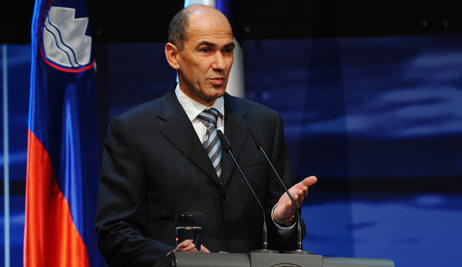NEWS
Prime Minister Janez Janša: Slovenia has shown sufficient reason to resolve far worse situations
In last night’s discussion on TV Slovenia's Odmevi programme, the Prime Minister of the Republic of Slovenia, Janez Janša, focused especially on the measures which are being adopted in Slovenia for the purpose of improving the financial and economic situation, but also touched on the talks held with police trade unions, Slovenia's commitments as a NATO member state, and the general situation in Europe. The Prime Minister stressed that Slovenia had made several steps towards improving the situation, including making amendments to tax legislation; one step, however, remains to be made, and that is the introduction of the golden fiscal rule into the Constitution.
"With the adoption of measures to balance the public finances and the add-ons to our ten-year bonds, we ended up below the sum paid by Italy for borrowing, which is the first time this has happened in years," he said, before adding that this is the first time this trend had changed for a long time. He was also of the opinion that the cuts envisaged by the Fiscal Balance Act are relatively modest and that a failure to adopt this act would spell the end for the current vast number of social systems and sub-systems. "If this foundation falls, many people will not be able to cover their salaries by the end of the year," he said. It was also in this light that he evaluated the negotiations with the police and the agreement rejected between the government and police trade unions. “We are playing with fatal issues," he underlined and added that "we have too much on our plates, so we must reach an agreement. I do not know what form plan B would take". The Prime Minister expressed his hope that an agreement between the Government and police trade unions would be reached and that the referendum petition would be withdrawn.
During the discussions, the Prime Minister also mentioned the economic measures planned by the Government which are intended to stimulate Slovenian growth in the coming year. If the measures are implemented by the summer, we may achieve the budgetary deficit objective of EUR 1.1 billion, the Prime Minister explained. He noted that the measures may only be implemented if the basis for them is effective. He added that he does not expect a considerable improvement to the employment situation in the first quarter of 2013 in comparison to this year. "Increased job numbers or a reduction in unemployment usually follows economic growth with a certain delay, and if the measures work, we will witness more optimistic actual figures as far as the labour market situation is concerned," he said. He added that higher employment figures imply the beginning of welfare growth in real terms.
As regards the situation in Europe and the issue of Greece, the Prime Minister assessed that the present situation in the EU and its member states was sending more positive than negative signals to the financial markets, but that the single strong signal coming from Greece and another two Mediterranean member states was unfortunately prevalent. He stated that artificial dilemmas and events in a relatively small segment – the Greek economy, for instance, constitutes less than 2% of EU GDP – sometimes cause major storms which may have real consequences, but which must be looked at in proportion. "The situation in Greece is dangerous and must be taken seriously, but we need to understand that the situation would be critical if it happened in Germany. This would imply the beginning of the end and spiral out of control," the Prime Minister explained.
As regards the political situation in Slovenia, the Prime Minister was of the opinion that it is bad for the country not to have a consolidated opposition. "It is in our interests to have an opposition which is consolidated, with which we may not agree but can nevertheless discuss issues. Unfortunately none of the opposition parties have accepted the development partnership, the hand we have extended since the outset. One of these parties rejected it outright," he said. The Prime Minister added that the state needs an opposition for certain solutions. "I hope we will get one consolidated opposition party within a month or so at least with which we may reach two-thirds majority agreements concerning issues that contribute to the identity of the state," he said, before stressing the importance of the introduction of the golden fiscal rule in the Constitution. “The introduction of the golden rule in the Constitution would send another positive signal which would reduce budgetary burdens," the Prime Minister concluded.





